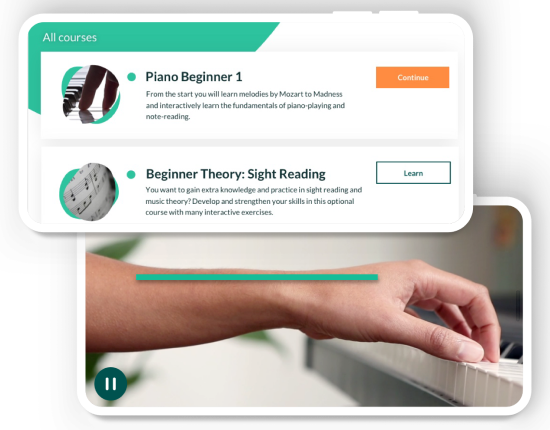Learning piano scales, and getting the most out of your practice, is all about your attitude. To the beginner, practicing scales might seem like a tedious and boring task. However, if you shift your perspective and view the practice of scales as an important tool in your repertoire of ways to become a better pianist, then scales will become much more enjoyable and exciting.
If you can find ways to exercise your imagination and creativity while simultaneously expanding your technical and theoretical knowledge of the piano and music, is that not a completely desirable outcome? This week, let’s explore some ways we can make practicing scales more fun and engaging.

Why practicing scales is necessary
Practicing piano scales is a necessary and extremely useful effort. You will gain a greater understanding of the specific nature of sounds, will develop and expand your technique as a pianist, and will broaden your understanding of music theory.
Learning and practicing scales is like stretching and exercising for an athlete, studying and investigating for a scientist, or preparing and organizing a kitchen for a chef. Practicing scales and arpeggios is preparatory work that enables us to feel more confident in our skills when the time comes to engage them.
6 ways to make practicing scales more enjoyable
It is possible for scales to feel tedious, boring, and robotic. If you feel that your scale practice has become lethargic, stale, and stagnant, then you need to engage your imagination to create some new ways to play them. Do not let yourself get lulled into a sense of boredom with your scale practice! Instead, online piano lessons can provide fun and fresh ideas for scale practice.
All the examples and ideas here will use the C major scale. The C major scale is spelled C – D – E – F – G – A – B – C with the scale degrees 1 – 2 – 3 – 4 -5 – 6 – 7 – 1. You can play it like this on the piano:
Create patterns and shapes
A great way to break out of habits or ruts with your scales and make them more fun and engaging for your mind and fingers is to create patterns and shapes out of them. For example, instead of simply playing the scale up and down, you could create a repeating pattern in the scale like this: 
Practice this pattern from C until you are comfortable with the shape, then move the shape up and down through the scale. This enhances your visual skills as well as provides your fingers with new pathways, which will help develop your technique in new ways.
There is no shortage of patterns like this you can create. Here is another one to try next:
Like the previous pattern, practice this example from C until you feel confident with the fingers. Then, shift the pattern up and down through the scale. This is a great exercise for developing the movement of major and minor thirds, which is an extremely common move in piano music!
Vary your rhythm
Another technique you can use to make your scale practice more fun and engaging is to vary your rhythm. How much thought have you put into the rhythms you use when you practice your scales? Do you usually play your scales in quarter notes? Or eighth notes? What about the combination of quarter notes and eighth notes like this:
Or a combination of eighth notes and quarter notes like this:
You can employ this same technique in the practice of patterns like we explored previously as well!
Shifting directions
How much have you thought about the directions you practice your piano scales? You can try shifting the directions of your hands to make your scale practice more challenging and engaging. Try the example below:
In this example, the left and right hands are moving in opposite directions from one another. You will also notice that the hands follow the same finger pattern when we practice in opposite directions!
A great practice is to begin with both hands moving in parallel motion, then when you reach the octave split the hands in opposite directions like in this example, then move the hands in parallel motion again. You can vary this kind of motion with the piano notes in many different ways, so get creative with it!
Start your hands in different places
A great way to find new and unexpected sounds and feelings is to practice your scales with your hands starting in different places. For example, try to play the notes of the C major scale with your left hand starting from C and your right hand starting from E like this:
Think of all the possible combinations you could make from the approach! There are quite a few new sounds to explore with just the C major scale by approaching this method.
You could even create a variation where you play two completely different scales at the same time! For example, stick with C major in your left hand and play the E major scale in your right hand like this:
What a wild sound combination that is! Remember, anything is possible when we are practicing scales. There are no rules, all we need to do is exercise a little creativity and imagination!
Practice with the metronome
Of course, the tried and true method is to practice your scales with the metronome. Use Skoove’s built-in metronome feature to enhance your skills!. The key is to make it feel like a game. So, come up with games that challenge your skills! 
Can you practice with the metronome so perfectly that the sound of the metronome disappears completely? Can you practice your scale using any of the patterns we have learned today on the slowest possible setting without playing ahead or behind the metronome? It is much more difficult to do consistently than you might imagine!
Can you play your scales perfectly in eighth notes with the metronome at a comfortable tempo? What about triplets or sixteenth notes? Are you capable of imagining the metronome on beats 1 and 3? Or 2 and 4? Or only on beat 1? All of these are examples of games you can play with the metronome to make your scale practice more fun and engaging for your hands and brain.
Make sure you have some fun!
Of course, what good is practicing scales if you do not spend a little time afterwards making some music! So, try to take a little time after your scale practice to create some spontaneous music with the scale you were just practicing. Yes, you need to practice the technical aspect of playing the piano, but you also need to practice your creativity with the techniques as much as possible. The ability to play a scale quickly up and down is not useful unless you can actually make something exciting happen with it! So throw some of the basic piano chords under your scales and have some fun!
Bringing it all together
Practicing scales is a necessary and useful part of developing as a pianist. You can think of practicing scales in the same ways an athlete might stretch or workout before a game or how a painter might explore their color palette before beginning to paint their masterpiece.
Scales form one essential building block of music, so it is crucial that you spend time with them. It is also crucial for you to find exciting and engaging ways to practice them! Finding new pathways to practice old patterns will ignite new connections in your brain and make your efforts with the piano more rewarding overall!
As always, Skoove is here to help you with those efforts. With hundreds of lessons from pop to rock to classical and everything in between, as well as an extensive online magazine of educational articles, Skoove has everything you need to become a great pianist!
Author of this blog post:

Eddie Bond is a multi-instrumentalist performer, composer, and music instructor currently based in Seattle, Washington USA. He has performed extensively in the US, Canada, Argentina, and China, released over 40 albums, and has over a decade experience working with music students of all ages and ability levels.














